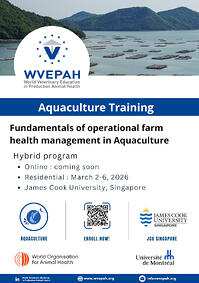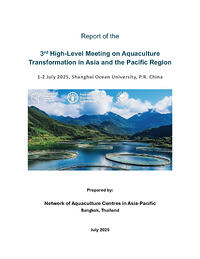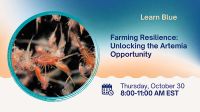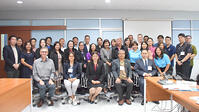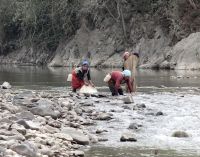The World Veterinary Education in Production Animal Health (WVEPAH) invites applications for Module I: Fundamentals of Farm Health Management in Aquaculture - part of a certification programme leading to worldwide recognition in Aquaculture Production and Health, delivered by Université de Montréal and validated by the World Organisation for Animal Health (WOAH).
This advanced hybrid training combines 40 hours of online learning with a residential week at James Cook University, Singapore, from 2-6 March 2026. The programme prepares aquaculture professionals to support farmers in disease prevention, biosecurity, surveillance, and product quality at farm, watershed, and national levels.
The course adopts a One Health approach, covering environment, nutrition, farm management, physiology, pathology, biosecurity, diagnostics, epidemiology, and international regulations. Through field visits and diagnostic laboratories, participants develop practical skills in necropsy, sampling, and case analysis.
Early bird registration (€2,400) closes 2 January 2026; regular fee €2,600.
The third High-Level Meeting on Aquaculture Transformation assessed progress towards 2030 transformation goals and identified priority actions for the Asia-Pacific region. The meeting report, covering discussions held 1-2 July 2025 in Shanghai, documents findings from representatives of NACA member governments, FAO and regional organisations.
Participants identified multiple barriers to sustainable intensification: farmer scepticism about unfamiliar technologies, limited access to expertise, and misaligned incentives that prioritise profit over environmental responsibility. Investment remains concentrated at higher levels rather than reaching small-scale producers. The discussions emphasised collaborative approaches, knowledge-based farming systems, and the need to document aquaculture's positive social impacts.
NACA and FAO will continue supporting National Innovation and Investment Plans in India, the Philippines, Thailand and Vietnam. Future work includes establishing an Aquaculture Innovation and Investment Hub and developing monitoring systems to track transformation progress across the region.
A free webinar "Farming resilience: Unlocking the Artemia opportunity" will be held on 30 October from 8:00-11:00 EST (13:00-16:00 UTC). This webinar will present the results of an in-depth analysis of Artemia production, conservation and investment opportunities by the World Bank Group, with expert input from members of the International Artemia Aquaculture Consortium.
Artemia (brine shrimp) is a critical live feed in aquaculture, particularly in hatcheries for shrimp, fish, and ornamental species. Its production and sustainable management are increasingly important as aquaculture expands globally. Global Artemia markets face increasing demand, while new innovations in farming, processing, and conservation offer opportunities for inclusive investment, resilience, and biodiversity protection.
This event will bring together global experts, policymakers, private sector representatives, and development partners to discuss the state of Artemia production and conservation, market opportunities, regulatory frameworks, and pathways for sustainable and viable investment.
Bangkok, 21-22 October 2025 - Thailand convened a two-day workshop at the Department of Fisheries to shape a National Innovation and Investment Plan (NIIP) for aquaculture. The meeting formed part of FAO’s Technical Cooperation Programme project TCP/RAS/4004, implemented with NACA, which is supporting India, the Philippines, Thailand and Viet Nam to prepare NIIPs and link them into a shared Aquaculture Transformation Monitoring, Evaluation and Learning System (ATMS) for Asia and the Pacific.
Small indigenous fish species (SIS) are common in South and Southeast Asian inland waters and are often eaten whole. This article reviews evidence that SIS provide bioavailable vitamin A, iron, zinc, calcium and B12, alongside protein and long-chain omega-3s. It examines practical options for including SIS in carp ponds and rice-fish systems, drawing on recent field programmes, and identifies constraints, especially the seasonal, unreliable supply of seed from capture fisheries. The article considers which species are realistic candidates for hatchery production and what husbandry is required. The aim is to give producers, extension staff and policymakers a clear view of when SIS integration adds value, and what investments are needed to pilot and scale it responsibly.
